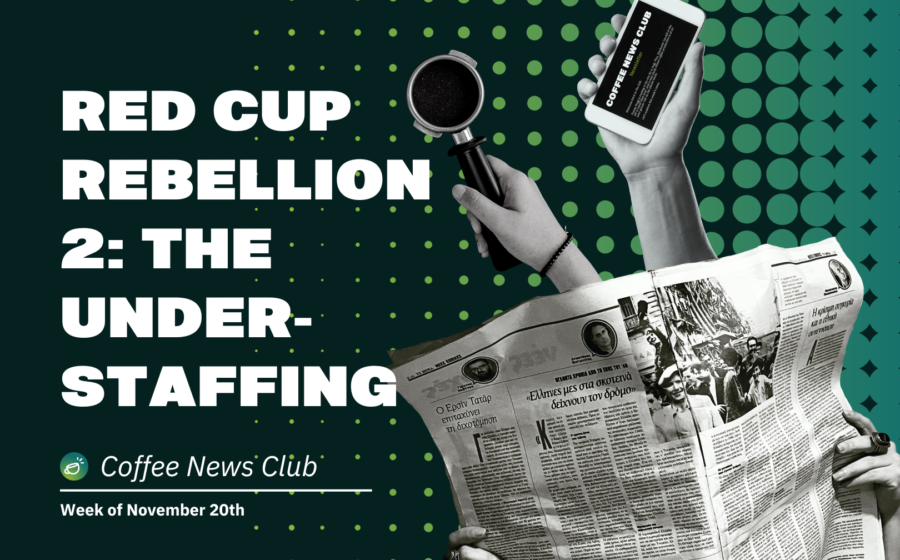Red Cup Rebellion 2: The Understaffing. Starbucks Workers United stages a nationwide strike on the company’s busiest day. Plus, which coffee pods are most sustainable and a Millennial dream music and coffee collaboration.
‘Starbucks Employees at Hundreds of US Stores Walkout on Red Cup Day’ – via Reuters
For the second year in a row, Starbucks workers at hundreds of stores across the United States walked off the job during Red Cup Day, the coffee giant’s busiest day. Starbucks Workers United said this year’s Red Cup Rebellion was the largest work stoppage in the company’s history.
The union described Red Cup Day, an annual event when Starbucks hands out reusable holiday-themed cups, as “one of the most infamously hard, understaffed days for the baristas” and called on the company to address workplace issues such as scheduling and understaffing. “I have heard our managers saying they need to hire 12 people,” Mary Boca, a barista in New York, told Reuters. “At a peak period, that’s a lot of people to be out of.”
Organizer Michelle Eisen told CNBC that the walkouts on Red Cup Day highlight the need for a fair contract that addresses understaffing. “In a situation like today, Red Cup Day, the barista is under that much more pressure to produce drinks at an extreme level,” Eisen said. “The reality is, when you have less work staff on the floor, you increase your profit margin. And the company knows that, and they exploit that.”
Starbucks played down the disruption, saying most of its US stores were open despite “a few dozen stores with some partners on strike.” In a previous statement to Reuters, the company also blamed Workers United for the lack of progress in contract negotiations, a charge that the National Labor Relations Board has repeatedly levied against Starbucks.
‘Study: These Types of Single-Serve Coffee Capsules Are Worst for the Environment’ – via Daily Coffee News
Some scientists consider coffee pods a more sustainable way to make coffee than other brewing methods (although this is debatable). But there are many kinds of capsules—compostable, aluminum, plastic, aluminum with a plastic lid, and a strange seaweed-coated ball. So which is best?
A new study from the Netherlands analyzed three different coffee capsule types and their associated greenhouse gas emissions and circularity—whether the materials can be recycled and fed back into the economy. The researchers found that their eco-friendliness varied widely, pointing to compostable pods as the most sustainable, followed by aluminum (assuming they can be recycled) and regular plastic.
The researchers from Wageningen University used a tool developed by the Ellen MacArthur Foundation which looks at recycling rates, recycled content, recycling process yield, bio-based content, reusability, and average lifespan of different materials. Using this tool, they investigated whether the various capsule materials could be repurposed or fed back into the economy, depending on different end-of-life scenarios like recycling or composting.
Compostable pods were considered the most sustainable. “The impact on global warming of the compostable capsules is quite low (especially when they are recycled),” the authors write. They also consider compostable pods fully circular because of their biobased and biodegradable materials.
Aluminum is the next-best option, but only if collected through specific return-and-recycle systems such as Podback. However, contamination from coffee grounds limits the number of times aluminum pods can be recycled, and voluntary participation in such mono-collection systems isn’t high.
Conventional plastic pods come last because although they generate “relatively low greenhouse gas emissions, they do not fit in a circular economy as neither the plastic capsules nor the spent coffee grounds are recycled.”
The researchers recommend that stakeholders such as policymakers, local governments and waste management organizations “thoroughly explore and assess possibilities to achieve the utmost circularity for both materials and spent coffee grounds, while minimizing environmental impact.” They write that any evaluation should include “reviewing existing barriers and determining the necessary policies, investments, and other requisites to surmount them.”
‘Camber Coffee Teams Up With Death Cab For Cutie & The Postal Service’ – via Sprudge
For those of us of a certain age, Ben Gibbard’s music was an integral part of our adolescence. Somehow, Gibbard managed to create two perfect albums in one year: Transatlanticism as a founding member of the band Death Cab for Cutie and Give Up as a member of the supergroup The Postal Service.
2023 marks the twentieth anniversary of both albums. To celebrate, Bellingham, Washington-based Camber Coffee will release custom coffees created in collaboration with both bands thanks to Gibbard’s longstanding relationship with former band photographer and current Camber marketing specialist Ryan Russell. For their coffee, The Postal Service chose a single-origin washed Ethiopia Riripa, while Death Cab went with a blend of coffees from Guatemala, Honduras, and Ethiopia.
“When approaching how each coffee would taste,” Russell told Sprudge, “I took into account a few of the preferences I knew about the band members and sent out some of our favorite coffees during the tour for everyone to brew together.”
The coffees are available on both bands’ websites, although Death Cab’s blend is—sadly—already sold out.
More News
‘Three New World Coffee Champions Will Be Crowned This Week In Taipei’ – via Sprudge
‘Trader Caravela Coffee Implementing Self-Management Model Called One Caravela‘ – via Daily Coffee News
‘Friends Coffee Shop, Central Perk, Opens First Permanent Location with a Matthew Perry Tribute‘ – via Entertainment Weekly
‘European Coffee Awards 2023 Shortlist Announced’ – via World Coffee Portal
‘Italian Equipment Specialist Gruppo Cimbali is Now Cimbali Group’ – via Daily Coffee News
‘Tim Hortons Enters Singapore’s Crowded Coffee Shop Scene‘ – via Bloomberg
‘SCA Green Coffee Summit Goes Live on Dec. 5 and 6‘ – via STiR Coffee and Tea
‘NY Firm General Atlantic Acquires Joe & the Juice for $641 Million‘ – via Daily Coffee News
The Week in Coffee Unionizing
- Non-union workers in New York City filed 32 new complaints against Starbucks, alleging the company violated the city’s labor law and adding to the number of allegations against the company. New York’s Fair Workweek law requires businesses to give their employees predictable schedules that stay the same from week to week, at least 14 days’ notice of their work schedules, and extra pay for any short-notice shift changes. Starbucks denies any illegality. “New York City passed the Fair Work Week law so workers like me would be able to sustain ourselves and our families,” barista Alberto Oliart told CNBC in a statement. “But Starbucks is blatantly ignoring the law, making it difficult for us to survive.”
- Nestlé has closed its last coffee plant in the US, shuttering its Freehold, New Jersey production facility despite attempts by unionized workers to keep it open. News first broke of the planned closure in June 2023, and Teamsters Local 11 staged demonstrations at the plant in response, hoping to save 220 jobs. Despite protests, the multi-billion-dollar Swiss conglomerate is moving coffee production to Mexico and Brazil. “This company should be ashamed for turning their backs on workers in Freehold and the community that has been home to this company for more than 70 years,” a Teamsters spokesperson said in a statement.
Coffee and the Climate Crisis
A shift in rainfall patterns, exacerbated by climate change, is leading to a decline in coffee production in two coffee-growing countries on opposite sides of the world.
In India, farmers expect a significant decline in coffee yields this year due to erratic rainfall patterns. The Coffee Board of India projected a 6.3% growth in production, while farmers forecast a drop between 25% and 30%. “We have had drought for three years (2015-18) followed by excess rain for four years (2018-22), and currently we are in another drought year,” a representative of the Karnataka Planters’ Association told the Deccan Herald. “In fact, this year most of the areas have received 50% of their rainfall in two weeks of July.”
Farmers have also dealt with falling coffee prices and wild animals trampling produce. “There are certain irrigation projects which have been taken up by the government of Karnataka,” a grower’s association representative said. “Apparently they have also come in the way of traditional and old migration routes of animals, especially elephants.”
Although they don’t have issues with elephants, unpredictable rain patterns have also affected coffee farmers in Hawaii. “We’re supposed to be in the rainy season. We have rain today but we also have a lot of sun,” Kona producer Jean Orlowsk told Hawaii Public Radio. “You can have rain for a few days and then you know you have a drought for a week and that’s very difficult for the tree.”
Farmers must also deal with increasing instances of Coffee Leaf Rust, which was first discovered on Maui in 2020 and has since spread to all Hawaiian islands. Researchers point to climate change as an exacerbating factor in the spread of the fungus, and it is part of the reason experts predict an 8% drop in production this year.
Beyond the Headlines
‘The Undying Popularity of Washed Coffees’ by Bhavi Patel
‘For Coffee Growers In Taiwan, The Future Is Now’ by Tung Nguyen
‘Column: Is the Specialty Coffee Sector Falling Behind on the Environment?’ by Sander Reuderink
‘For Coffee Professionals, The Impact Of Long COVID Is An Existential Threat’ by Jenn Chen






